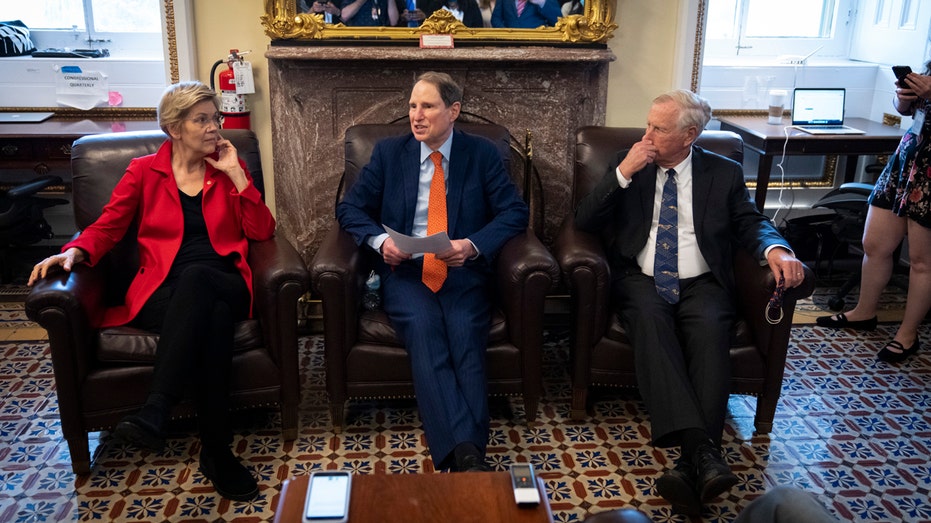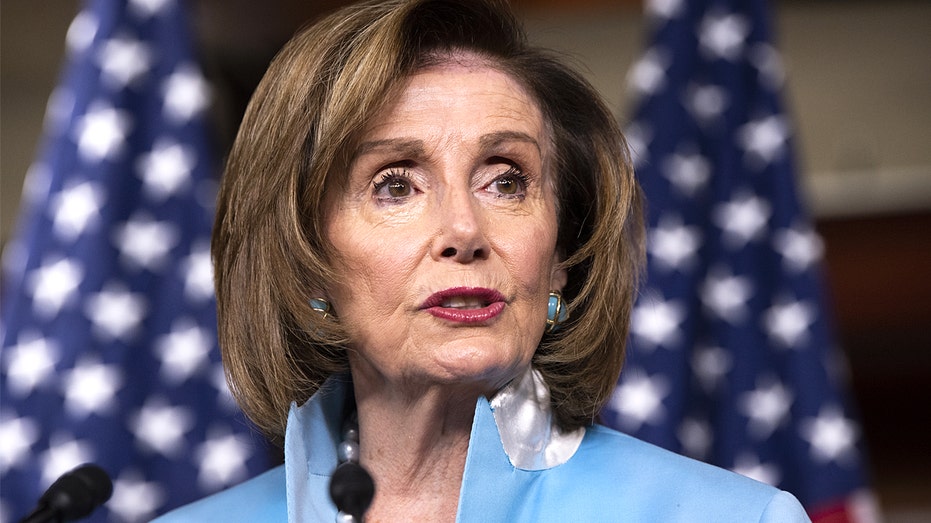How would the new billionaire income tax work?
Democrats' proposed billionaire tax reimagines what counts as taxable income
Jeff Greene calls billionaire tax 'ridiculous' for punishing the wealthy
Real estate mogul and self-made billionaire Jeff Greene comments on 'poorly thought out' tax proposal.
Democrats are considering a groundbreaking new tax on billionaires and other ultra-high earners in order to pay for the bulk of President Biden's signature economic spending plan.
Though Biden did not endorse a billionaires' tax during the 2020 presidential campaign, he's thrown his support behind it in recent days after a different tax-hike plan that targeted well-off corporations and Americans earning more than $400,000 a year hit a roadblock.
Biden has promised that his vast spending proposal, which would expand the social safety net, will not add a penny to the nation's ballooning $28 trillion debt.
Here's a closer look at the proposed tax:
How would it work?
The tax would target the unrealized gains of billionaires, including stocks as well as other assets, like real estate, bonds and art, which can become vessels for the wealthy to legally store their fortunes and reduce their tax liabilities. (Many of the ultra-rich derive their vast wealth from the soaring value of assets like stock and property, which are not considered to be taxable income unless that individual sells).
But the latest proposal, which would only apply to the top sliver of the wealthiest Americans, would tax billionaires on their gains regardless of whether they have sold the asset or not – essentially changing what is viewed as taxable income. Under current law, a gain is only taxed if and when the owner sells the asset.

From left, Sen. Elizabeth Warren, D-Mass., Sen. Ron Wyden, D-Ore., and Sen. Angus King, I-Maine, speak to reporters about a corporate minimum tax plan at the U.S. Capitol Oct. 26, 2021, in Washington, D.C. (Photo by Drew Angerer/Getty Images / Getty Images)
Billionaires would have to pay a tax that's calculated based on the difference between an asset's value at the beginning of the year and at the end of the year.
For instance, Amazon CEO Jeff Bezos makes a salary of about $80,000 annually. But over the period between 2010 and 2018, his unrealized capital gains from his Amazon stock holdings were about $10 billion a year on average, according to Chuck Marr, director of federal tax policy at the Center on Budget and Policy Priorities.
Under that simplified example, if Bezos did not sell any of his Amazon shares in a given year, the income tax would ignore the $10 billion gain – meaning that Bezos, the richest person in the world, is effectively taxed like a middle-class person earning $80,000 a year. The plan from Democrats would target that $10 billion gain and tax it as income.
"With the Billionaires tax, policymakers, in effect, are saying it makes more sense– it is a more accurate assessment– to account for the income from capital gains when the gain occurs (i.e. on an accrual basis) rather than on a cash basis (i.e. when it is sold)," Marr said.
PELOSI PROMISES DEMS WILL PASS SPENDING BILL 'SOON' AMID INTERNAL FIGHTING
Individuals could claim deductions for annual losses in the value of their assets.
Who would have to pay?
The proposal would only affect taxpayers with more than $1 billion in assets, or those with incomes of more than $100 million for three consecutive years – so 2019, 2020 and 2021 to begin. Some critics have argued it paves the way for additional tax hikes down the road.
Anyone who meets those thresholds would stay in the alternative tax system until their income and assets fell below the minimum for at least three straight years. The Bloomberg Billionaires Index estimates that Americans worth at least $1 billion hold more than $5 trillion in wealth.
That tax encompasses about 700 individuals, or roughly 0.0002% of the richest Americans.
How much money would the tax generate?
House Speaker Nancy Pelosi estimated during an interview on CNN Sunday that the tax would generate between $200 billion and $250 billion in new revenue over the next decade. That's well below the topline figure of at least $1.5 trillion that Democrats are looking to spend over the next decade in order to bolster family care, education and health care.
As a result, lawmakers are looking for other pay-fors, including a global minimum tax and increased enforcement money for the IRS.

Speaker of the House Nancy Pelosi, D-Calif., conducts her weekly news conference in the Capitol Visitor Center on Friday, Aug. 6, 2021. ((Photo By Tom Williams/CQ-Roll Call, Inc via Getty Images) / Getty Images)
The Joint Committee on Taxation has not released an official revenue estimate.
Will the proposal pass and become law?
It's unclear whether the tax, which would be the first of its size and scope in an advanced economy, will be backed by every Senate Democrat and nearly every House Democrat — the required threshold for its passage.
Though he initially suggested that he was open to the tax, Sen. Joe Manchin, D-W.Va., on Wednesday walked back some of that support. Still, he didn't outright say that he would vote against the measure, which is needed to finance Democrats' sweeping social spending plan.
"I don’t like it," he told reporters. "I don't like the connotation that we're targeting different people, as people that basically, they contributed to society and create a lot of jobs and a lot of money and give a lot to philanthropic pursuits. But it's time that we all pull together and grow together."
GET FOX BUSINESS ON THE GO BY CLICKING HERE
Other Democrats have also cast doubt on the tax, with House Ways and Means Chairman Richard Neal warning it would be difficult to implement. Neal, D-Mass., suggested the House's tax-increase bill – which reversed the bulk of Republicans' 2017 Tax Cuts and Jobs Act – was more straightforward and easier to adopt.
The proposal marks a significant shift from Biden's initial tax hike proposal, which largely targeted well-off corporations and Americans earning more than $500,000. But Sen. Kyrsten Sinema, D-Ariz., expressed opposition to the higher tax rates on corporations, individuals and capital gains, arguing it would do little to improve the nation's economic competitiveness or crack down on tax evaders.
Is it constitutional?
Scholars are deeply divided about the legality of such a levy, but if the tax became law, it would almost certainly be challenged in court.
Under Article 1, Section 2 of the Constitution, Congress has the power to impose direct taxes under the rule of apportionment – essentially guaranteeing impartial federal treatment of states by requiring the government to levy direct taxes in a way that results in an equal amount collected in each state.
The 16th Amendment then semi-overrides that by giving the government the capability to impose an income tax without apportionment, meaning Congress doesn’t have to ensure equal treatment if the direct tax is an income tax. That means the 6-3 Supreme Court would likely have to determine whether the wealth tax is a direct tax on property that is therefore unconstitutional or whether it's a direct tax on income and is constitutional.





















